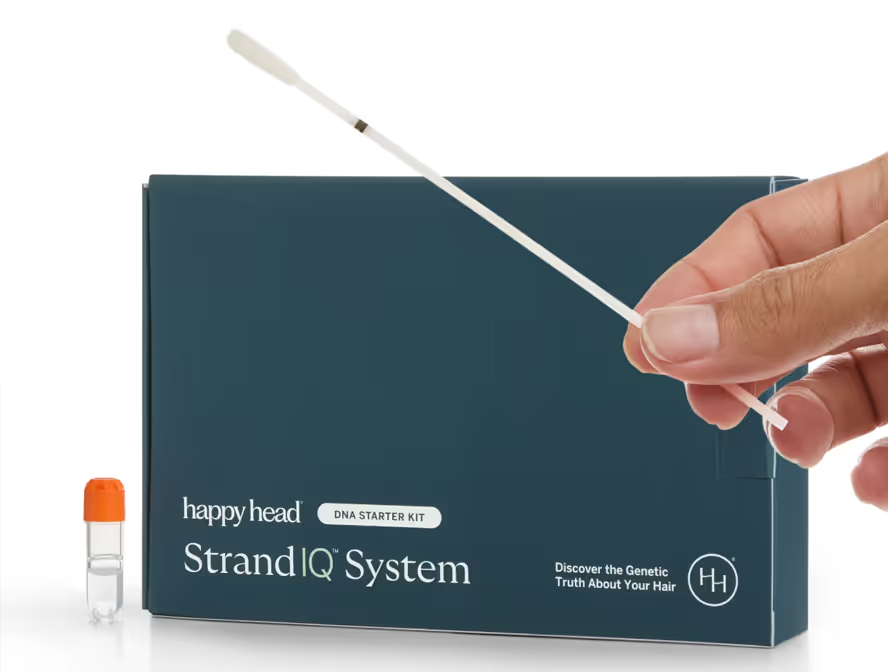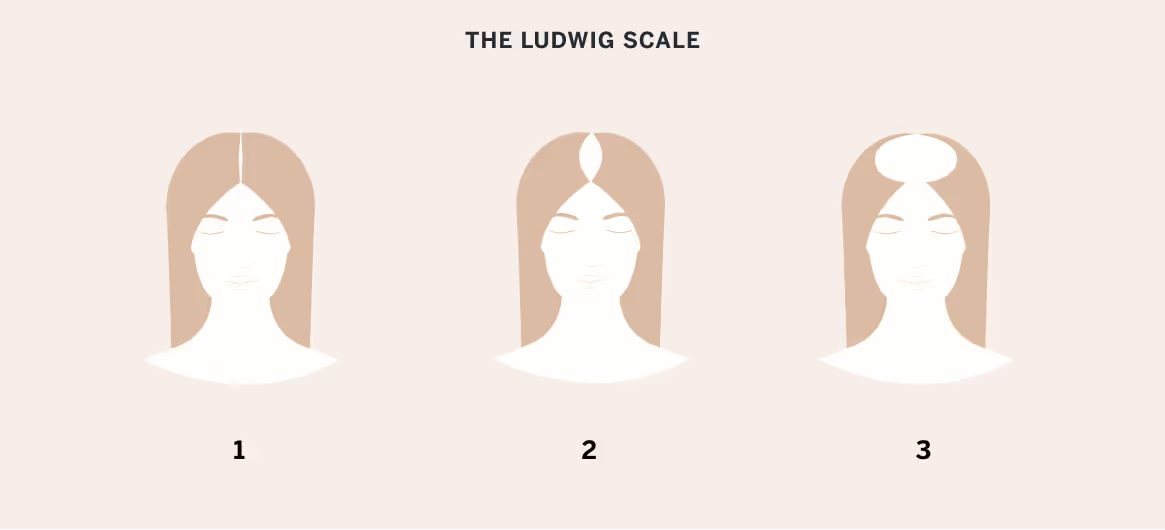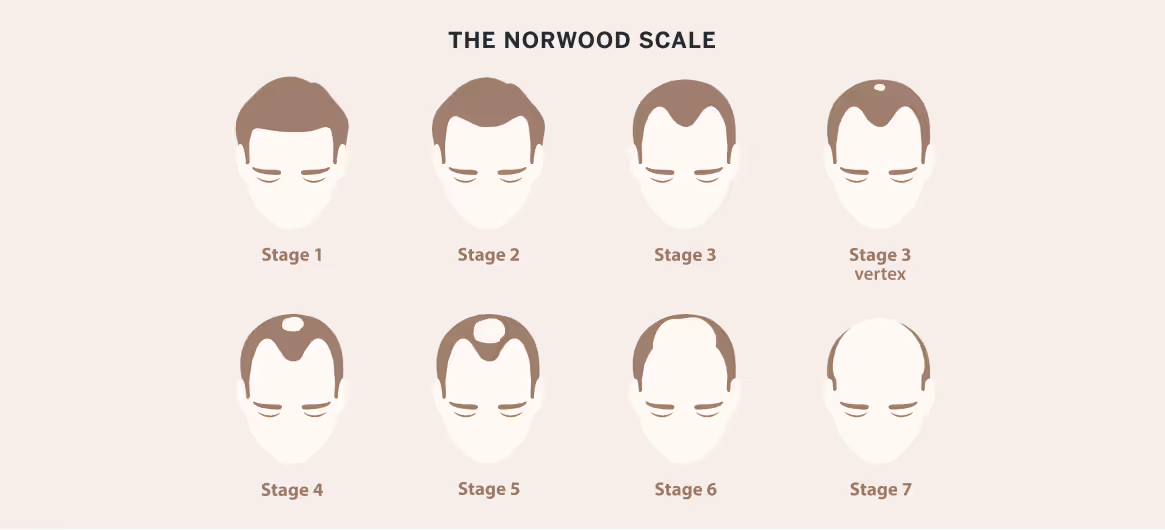Scalp psoriasis hair loss can feel like a double burden—you're managing a chronic skin condition while watching your hair thin or fall out in the process. For many, it’s not just about appearance; it’s about comfort, self-esteem, and quality of life.
This type of hair loss is often misunderstood, overlooked, or mistaken for something else entirely.
In this guide, we’ll explain why it happens, how to recognize it, and, most importantly, what you can do to stop it and products to support regrowth with medical insight and practical strategies.
What Is Scalp Psoriasis Hair Loss?
Scalp psoriasis hair loss, also known as psoriatic alopecia, occurs when chronic inflammation from psoriasis affects the scalp and contributes to temporary shedding or thinning of hair.
Psoriasis, an autoimmune condition, causes the rapid buildup of skin cells, resulting in the formation of scaly, red patches on the scalp.
While psoriasis itself does not directly destroy hair follicles, the resulting inflammation, scaling, and irritation, combined with behaviors such as scratching, can lead to hair loss.
This condition is often reversible with proper treatment. Managing both the underlying psoriasis and hair care habits is essential for minimizing hair loss and promoting healthy regrowth.
How Scalp Psoriasis Leads to Hair Loss
Scalp psoriasis triggers an overactive immune response, causing skin cells to multiply too quickly. This leads to thick, scaly plaques that can irritate the scalp and surround hair follicles.
Inflammation alone may disrupt the normal hair growth cycle, but additional mechanical stress, such as frequent scratching or aggressive removal of plaques, can further traumatize the follicles.
Over time, this disruption can result in noticeable thinning or patchy hair loss, although follicles are usually not permanently damaged.
The dermatologists at Happy Head can provide custom topical solutions containing soothing ingredients such as hydrocortisone and formulated to reduce inflammation and promote regrowth.
Is Hair Loss From Scalp Psoriasis Permanent?
In most cases, hair loss from scalp psoriasis is temporary. The inflammation and irritation responsible for shedding typically don’t damage the follicles themselves. Once psoriasis is effectively controlled and the scalp is allowed to heal, hair often regrows.
However, chronic or untreated cases, especially when accompanied by excessive scratching or harsh treatments, may prolong recovery or, in rare cases, lead to scarring and permanent follicular damage. Early intervention can significantly improve the chances of full regrowth.
Main Causes of Hair Loss in Scalp Psoriasis
Hair loss from scalp psoriasis doesn’t stem from a single cause but rather a combination of inflammatory, behavioral, and environmental factors.
Understanding these underlying contributors can help patients and providers create a more effective, personalized treatment plan.
Inflammation and Its Effects on Hair Follicles
Inflammation is the primary culprit behind scalp psoriasis hair loss. When the immune system attacks healthy skin cells, it triggers an inflammatory response that can interfere with the hair growth cycle.
Inflammatory cytokines can impair follicular function and prematurely push hairs into the resting (telogen) phase. Over time, this leads to diffuse thinning or shedding.
Although the hair follicles aren’t destroyed, prolonged inflammation may delay regrowth. Effective anti-inflammatory treatment is key to restoring healthy follicular activity and minimizing long-term damage to the scalp environment.
Scratching and Picking
Persistent itching is a hallmark of scalp psoriasis, and scratching or picking at plaques can traumatize the scalp. This mechanical damage may loosen hair at the root, cause breakage, or even lead to folliculitis.
Over time, repeated trauma can create a hostile environment for hair growth. While the follicles usually remain intact, aggressive behavior may prolong hair loss or lead to patchy regrowth. Managing itch and minimizing physical irritation are critical steps in recovery.
Treatments and Hair Products
Certain psoriasis treatments, particularly harsh topical agents or overused medicated shampoos, can dry or irritate the scalp, weakening the hair shaft and contributing to breakage.
Methotrexate, an antimetabolite often used to treat psoriasis, can directly cause hair loss in a small percentage of patients. Additionally, ingredients in styling products or shampoos not formulated for sensitive skin may further inflame the scalp.
While treatment is necessary, overapplication or using incompatible products can backfire. A dermatologist can help patients balance effective psoriasis care with gentle hair maintenance to prevent treatment-related shedding.
Happy Head offers a special thickening shampoo specifically designed for sensitive scalps, combining gentle cleansing with ingredients that support hair growth and scalp comfort.
Telogen Effluvium
Telogen effluvium is a type of temporary hair loss triggered when a large number of hairs enter the resting (telogen) phase prematurely.
In people with scalp psoriasis, this can result from emotional stress, chronic pain, depression, or the reduced quality of life the condition often causes. Systemic inflammation may also play a role.
Though telogen effluvium doesn’t permanently damage follicles, it can cause noticeable shedding and may persist for months without proper intervention.
Recognizing the Signs of Scalp Psoriasis Hair Loss
The signs of scalp psoriasis hair loss can be subtle at first and are often mistaken for normal shedding or dandruff-related irritation. However, distinguishing psoriasis-induced shedding from other scalp conditions is key to early treatment and regrowth.
Symptoms To Watch For
Scalp psoriasis hair loss tends to follow or coincide with worsening skin symptoms. Key indicators include:
- Red, scaly patches or plaques on the scalp.
- Tenderness or soreness on the scalp.
- Itching or burning that leads to frequent touching or picking.
- Increased hair shedding, especially after scratching or washing.
- Brittle or broken hairs around affected areas.
- Noticing more hair on your pillow, in the shower, or on your brush.
- Thinning hair or bald patches on the scalp.
If you notice any of these symptoms, it's essential to consult with a dermatologist. They can help diagnose the condition and develop an appropriate treatment plan.
How To Tell the Difference Between Psoriasis and Dandruff
Scalp psoriasis and dandruff can sometimes be mistaken for one another, as both conditions can cause flaking and itching on the scalp, but there are some key differences:
- Appearance: Psoriasis scales tend to be thicker, drier, and more silvery in appearance, while dandruff flakes are usually smaller, whiter, and oilier.
- Location: Psoriasis often extends beyond the hairline, affecting areas such as the forehead, neck, and ears, while dandruff is typically confined to the scalp.
- Intensity: The itching and discomfort associated with psoriasis tend to be more severe than with dandruff.
If you're unsure whether you're dealing with scalp psoriasis or dandruff, it's best to consult with a dermatologist for an accurate diagnosis.
Can Hair Grow Back After Scalp Psoriasis Hair Loss?
Yes—hair loss caused by scalp psoriasis is typically reversible. Since the follicles are rarely permanently damaged, regrowth is often possible once inflammation subsides and the scalp heals.
With appropriate treatment and gentle care, many patients see noticeable hair return over several months. Recovery depends on managing both psoriasis and contributing stressors or habits.
What To Expect During Regrowth
Hair regrowth after scalp psoriasis is often gradual. You may first notice soft, fine hairs—known as vellus hairs—emerging in previously affected areas. Over time, these hairs thicken and resemble your normal texture.
Regrowth may be uneven at first, especially in areas with more prolonged inflammation or trauma. If telogen effluvium is a factor, hair may return diffusely.
Flare-ups can disrupt progress, so consistency in treatment and scalp care is key to supporting regrowth and minimizing setbacks.
How Long Recovery Takes
Hair regrowth typically begins within a few months of controlling the underlying psoriasis, but full recovery can take six months to a year, depending on the extent of hair loss and overall scalp health.
If telogen effluvium is involved, the regrowth cycle may be delayed by several weeks. Persistent scratching or plaque buildup can further extend recovery time.
It's important to be patient and consistent with your treatment plan during the recovery process. Working closely with a dermatologist ensures treatment remains effective and any new or prolonged shedding is properly addressed.
How To Prevent Scalp Psoriasis Hair Loss Naturally
There are several natural ways to prevent and manage scalp psoriasis hair loss. By incorporating these strategies into your hair care routine, you can promote a healthier scalp and minimize the risk of further hair loss.

Gentle Hair and Scalp Care Tips
One of the most important things you can do to prevent scalp psoriasis hair loss is to practice gentle hair and scalp care. This includes:
- Using lukewarm water instead of hot water when washing your hair.
- Avoiding harsh shampoos and opting for gentle, fragrance-free formulas.
- Applying a high-quality conditioner after shampooing.
- Gently massaging the scalp to promote circulation and reduce inflammation.
- Patting the hair dry instead of rubbing it vigorously with a towel.
- Minimizing the use of heat styling tools and harsh chemical treatments.
By treating your hair and scalp with care, you can reduce irritation and create a more hospitable environment for healthy hair growth.
Natural Remedies for Scalp Psoriasis
Several natural remedies may help soothe the scalp and reduce inflammation associated with scalp psoriasis. Some options to consider include:
- Applying aloe vera gel to the scalp to reduce itching and promote healing.
- Using tea tree oil, which has anti-inflammatory and antimicrobial properties.
- Massaging the scalp with coconut oil to moisturize and reduce flaking.
- Trying an apple cider vinegar rinse to help balance the scalp's pH levels.
While these natural remedies can be helpful, it's essential to talk to your dermatologist before incorporating them into your treatment plan, as some may interact with medications or cause irritation in sensitive individuals.
Stress Management and Lifestyle Changes
Stress is a common trigger for scalp psoriasis flare-ups, which can contribute to hair loss. By managing stress and making small but meaningful lifestyle changes, you can help reduce the frequency and severity of flare-ups. Some strategies to consider include:
- Practicing relaxation techniques such as deep breathing, meditation, or yoga.
- Getting regular exercise can help reduce stress and improve overall health.
- Maintaining a healthy, balanced diet rich in anti-inflammatory foods.
- Getting enough sleep and establishing a regular sleep schedule.
- Avoiding triggers such as alcohol, smoking, and certain foods that may exacerbate symptoms.
Effective Medical Treatments for Scalp Psoriasis Hair Loss
While natural remedies and lifestyle changes can be helpful, medical treatments are often necessary to effectively manage scalp psoriasis hair loss. Your dermatologist can help you develop a personalized treatment plan that addresses your specific needs.
Topical Treatments and Medicated Shampoos
Topical treatments and medicated shampoos are often the first line of defense against scalp psoriasis hair loss. These products can help reduce inflammation, slow down the rapid growth of skin cells, and soothe the scalp. Some common options include:
- Corticosteroid creams or solutions to reduce inflammation and itching.
- Salicylic acid shampoos help soften and remove scales.
- Coal tar shampoos slow down skin cell growth and reduce inflammation.
It's essential to follow the instructions provided by your dermatologist when using these products, as overuse or improper application can lead to side effects or further irritation.

Prescription Medications and Biologics
In more severe cases of scalp psoriasis hair loss, prescription medications or biologics may be necessary. These treatments work by targeting specific aspects of the immune system to reduce inflammation and slow down the overproduction of skin cells. Some options include:
- Oral retinoids help normalize skin cell growth and reduce inflammation.
- Oral minoxidil to improve blood flow to the scalp and prolong the anagen phase.
- Methotrexate, an immunosuppressant that can slow down skin cell growth.
- Cyclosporine, another immunosuppressant, can help reduce inflammation.
- Biologics are injectable medications that target specific proteins in the immune system.
These medications can be highly effective in managing scalp psoriasis hair loss, but they also come with potential side effects. Work closely with your dermatologist so they can monitor your response to treatment and adjust as needed.
When To See a Dermatologist
If you're experiencing scalp psoriasis hair loss, it's essential to consult with a dermatologist. They can diagnose the condition, assess the severity of your symptoms, and develop an appropriate treatment plan. Some signs that it's time to see a dermatologist include:
- Persistent or worsening hair loss despite at-home treatments.
- Severe itching, burning, or pain on the scalp.
- Visible signs of infection, such as pus or fever.
- Emotional distress or self-consciousness related to hair loss.
The earlier you seek treatment, the better your chances are of managing scalp psoriasis hair loss effectively and preventing further damage to your hair and scalp.
Managing Scalp Psoriasis Hair Loss
Living with scalp psoriasis and hair loss can be frustrating, but it’s important to remember that you’re not alone—and that healing is possible.
With the right combination of medical care, gentle scalp practices, and lifestyle support, many people experience meaningful improvement and even full regrowth. Progress may take time, but each step you take brings you closer to relief.
A compassionate, experienced dermatologist can help you navigate flare-ups, reduce shedding, and restore confidence as you manage scalp psoriasis hair loss, so don’t wait to reach out for help.
Talk to a board-certified dermatologist to discuss your goals and find the solution that is best for you.
Frequently Asked Questions
Does hair loss from scalp psoriasis grow back?
Yes, in most cases, hair loss due to scalp psoriasis grows back once inflammation is controlled, although the rate and extent can vary. The loss is usually temporary and caused by scratching, inflammation, or stress, not permanent damage to the hair follicles.
What is the fastest way to cure psoriasis on the scalp?
While there is no cure for psoriasis on the scalp, the fastest relief often comes from medicated shampoos, topical corticosteroids, and prescription treatments such as biologics. Consistent treatment under a dermatologist’s care can significantly reduce flares and improve scalp health.
Should I wash my hair often if I have scalp psoriasis?
Washing your hair regularly—typically 2–3 times per week—with a gentle or medicated shampoo can help manage scalp buildup and reduce inflammation. Overwashing, however, may worsen irritation, so balance and product choice are key. Avoid harsh shampoos and excessive scrubbing to prevent further irritation.
What is triggering my scalp psoriasis?
Common triggers for scalp psoriasis include stress, cold weather, infections, certain medications, and skin injuries. Even hair products or harsh shampoos can worsen symptoms. Identifying and avoiding your specific triggers can help prevent flare-ups.












